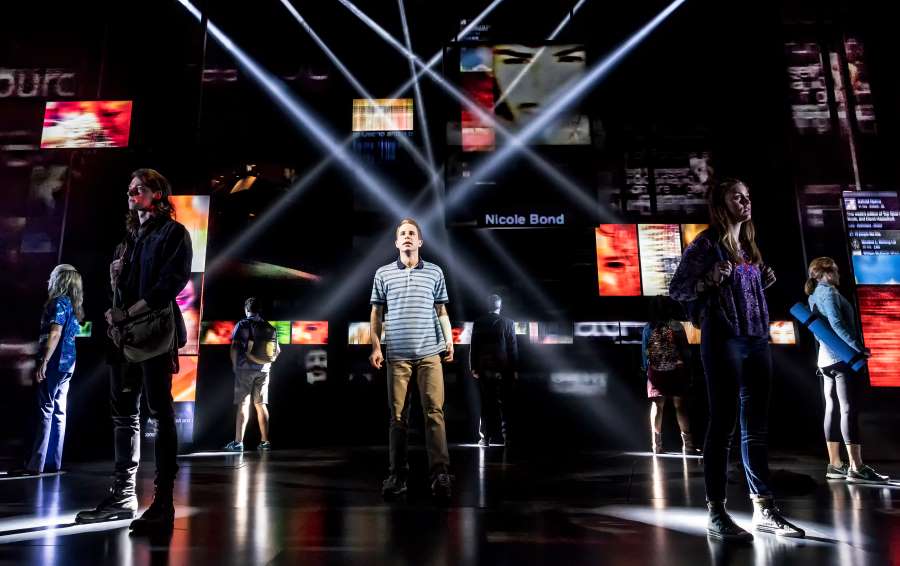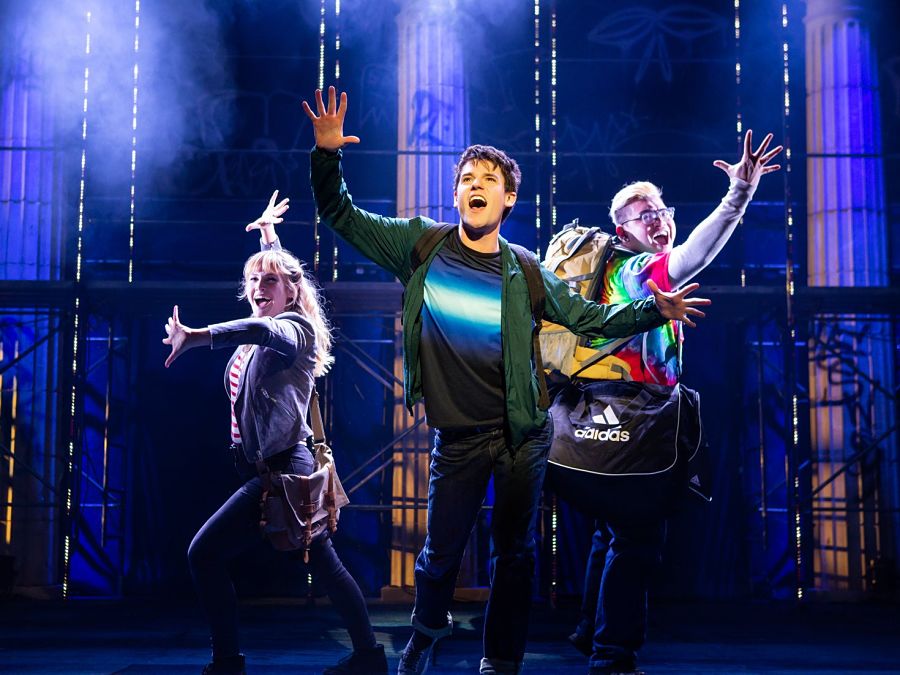When it comes to teenagers and Broadway, 2016’s Dear Evan Hansen changed the game. The Tony-winning Pasek and Paul musical was certainly not the first Broadway show about—or beloved by—teens. That credit might go to Spring Awakening (2006) or 13 (2008) or Runaways (1978), or much further back to Babes in Arms (1937), considered the first musical with an entire cast of teenage characters. In the wake of Dear Evan Hansen’s success, Broadway quickly saw a sweep of major productions with teenage protagonists: Mean Girls (2018), Harry Potter and the Cursed Child (2018), The Prom (2018), Choir Boy (2019), Be More Chill (2019), and the latest installation, The Lightning Thief: The Percy Jackson Musical (2019). But Dear Evan Hansen catalyzed the birth and rapid expansion of a seemingly new subgenre, the teen musical.
The teen musical is a distinct form, related to but different from Theatre for Young Audiences (TYA), which on Broadway is often inspirational and/or educational (Matilda, A Year With Frog and Toad). Teen musicals are usually less directly didactic, and typically focus on coming-of-age stories. Instead of TYA, a closer and more accurate analog for the teen musical is young adult (YA) fiction. Drawing on this similar literary subgenre, it might be helpful to think of shows like The Lightning Thief as Young Adult Theatre.
This budding stage genre’s initial avatar, Dear Evan Hansen, was almost universally praised by critics, not only for its timely examination of social media and teen suicide but also its catchy pop score of power ballads and acceptance anthems. Mean Girls and Harry Potter received similar fanfare, if not quite as uniform praise. But critical consensus about Young Adult Theatre took a sharp turn when the subgenre became solidified, popularized, and canonized with the viral teen hit Be More Chill. Joe Iconis’s musical, which made it to Broadway thanks to a huge, enthusiastic teenage fanbase online, received vitriol from many critics who called it loud, hollow, and vapid.
The disdain for Young Adult Theatre reached its peak with reviews for The Lightning Thief (on Broadway through Jan. 5, and slated to tour the country through 2021), many of which called it poorly written, low-budget, and painfully childish. I agree that the show’s shabby design, inflated book, sketchy lyrics, and imbalanced sound levels deserves critique. It is not a great musical—unless, of course, you grew up with the Rick Riordan book series it’s based on, as I did, in which case you may very well have a great time seeing a familiar story on the stage (or precisely because you love the books, you may be gravely disappointed, as I was).
But even granted that the show is supbar, there are issues with how the show has been criticized and for what. For one, I think it’s a problem that critics went out of their way to be mean. As with last season’s King Kong, critics used reviews of The Lightning Thief as an unofficial competition for crafting the most cutting insults. Frank Scheck’s piece in The Hollywood Reporter called the show a continuation of the “infantilization of Broadway.” Critics were similarly quick to call the show the nadir of an annoying trend, claiming that the musical’s focus on adolescence is the source of its problems.
I think it’s wrong for critics to write off Young Adult Theatre as undifferentiated juvenile trash. In a piece for Medium, Alexandra Middleditch referred to “critics’ vicious bias against the teen musical subgenre.” Middleditch rightly noted that the common comparison to Dear Evan Hansen is lazy, as Dear Evan Hansen and The Lightning Thief have little in common, other than that both are about teenagers and have pop scores. In fact The Lightning Thief is closer to Harry Potter, as both are about quests undertaken within fantastical worlds.
In short, critics should stop ridiculing Young Adult Theatre writ large, and should look more closely look at the different kinds of shows within this subgenre. Dismissing every show about teenagers as loud and whiny is bad journalism, and comes off as a case of baby boomers complaining about seeing so many young people onstage.

The genre deserves a larger critique, but not the one critics are making. Yes, Young Adult Theatre can seem angsty, the pop score/lyrics can feel basic and the plots contrived. But the central problem with Dear Evan Hansen, Harry Potter and the Cursed Child, Be More Chill, and The Lightning Thief is that they’re all about straight, white, cisgender teenage boys. The supporting casts are often diverse, but the main characters don’t deviate from this norm. Not only are these protagonists about as privileged as they come; worse, each of these pieces is about its hero’s search for his identity. Compared to a person of color, a queer person, a transgender person (let alone any intersection of these), how much do Evan, Harry, Jeremy, or Percy have to figure out about themselves?
The challenges these protagonists face include navigating friendships with other boys, relationships to parents, and/or crushes on girls. Sometimes they have to go on physical journeys to do so; at times they must defeat foes along the way. (To be fair, Percy also has some classroom-based learning difficulties to contend with and Evan grapples with anxiety.) But the central goal is always to figure out who they are and their place in the world. The notion that these boys have uniquely harrowing identity crises worth dramatization reeks of privilege; none really faces forms of prejudice or bias in their lives. While each deals with narrative-driven hardships, almost none of their problems are inherent to their identity. Jesse Green in The New York Times came close to this point, calling The Lightning Thief another musical about “quite privileged youngsters.”
Green doesn’t explore this further, but the point is worth lingering on. In The Lightning Thief, Percy is a demigod and his father, Poseidon, is a god. At camp with other half-bloods, Percy and his friends sing, “Oh, things couldn’t be worse when you parents run the universe.” There is, of course, supposed to be a tinge of irony here, but none of the characters are self-aware to really grasp the depth of their privilege—and seemingly, neither are the authors or critics. Percy, Evan, Harry, and Jeremy are literally demigods of the world, adolescent pictures of privilege who will grow up to be the gods of our culture: the straight, white, cis men who still run the world.
The Lightning Thief ends with the song “Bring on the Monsters,” with Percy and co. singing, “Are we ever gonna once have it easy?” and “Bring on the real world” and “The battle’s just begun.” But who are the monsters that lurk in our “real world”? Spoiler alert: They are powerful men, grown-up versions of boys like Percy, Evan, Harry, and Jeremy. They begin as teens in Young Adult Theatre and end up as clueless, privileged men in plays like Linda Vista. These completely non-diverse teenage protagonists are not reflective of the real-life people fighting today’s most urgent battles. Instead they represent the exact group who always has it the easiest. Bring on the monsters, indeed.
While critics seem to have turned on teen musicals, shows like The Lightning Thief and Be More Chill do have sizable online fan bases, even if the shows don’t represent the complex identities of their own fans. Teens on Twitter have even taken to playfully projecting queer and gender-nonconforming identities onto these shows’ characters, in an attempt to make the characters feel closer to their lives.
Ads for Dear Evan Hansen tout the laughable claim that “We are Evan Hansen.” We are decidedly not all straight teenage white boys! Indeed, many teenagers live much more difficult lives than these protagonists, have complex (often intersectional) identities to figure out, and have to navigate all kinds of barriers and discrimination. For many, whether a girl will like them is not the main mystery of life. But watching most Young Adult Theatre on Broadway, you certainly wouldn’t know this.
The solution is not to stop bringing Young Adult Theatre to Broadway. It is to have better, more representative Young Adult Theatre. The problem is not that the shows are about teenagers, as the critics seem to think; the problem is which teenagers they’re about. We need more shows like The Prom or Choir Boy: plays and musicals about teens who aren’t white, cis, straight, and/or able-bodied. We need to be telling more stories and to move past the supposedly heroic journey of straight, white, cisgender boys.
In The Lightning Thief, Percy’s love interest, Annabeth, gets a pretty basic female empowerment anthem, in which she sings, “My grand plan is that I will be remembered…And someday soon the world will notice me.” Creators of Young Adult Theatre, listen to Annabeth. We need fewer shows about the Percys of the world and more shows about the diverse supporting characters who are too easily shoved to the side. They’re more than ready for the spotlight.
Christian Lewis is a queer theatre critic and freelance theatre journalist with bylines in HuffPost, Broadway World, Exeunt, Medium, and Out. Lewis is a Ph.D. candidate in English at the CUNY Graduate Center and is an adjunct professor at John Jay College of Criminal Justice.
CREATIVE CREDITS FOR PHOTOS:
The Lightning Thief. Book: Joe Tracz; music and lyrics: Rob Rokicki; direction: Stephen Brackett; choreography: Patrick McCollum; scenic design: Lee Savage; costume design: Sydney Maresca; lighting design: David Lander; sound design: Ryan Rumery.
Dear Evan Hansen. Book: Steven Levenson; songs: Benj Pasek and Justin Paul; direction: Michael Greif; choreography: Danny Mefford; set design: David Korins; projection design: Peter Nigrini; costume design: Emily Rebholz; lighting design: Japhy Weideman; sound design: Nevin Steinberg.


